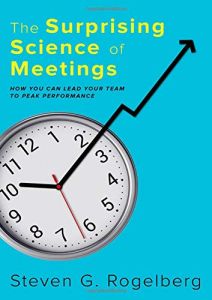Join getAbstract to access the summary!

Join getAbstract to access the summary!
Steven G. Rogelberg
The Surprising Science of Meetings
How You Can Lead Your Team to Peak Performance
Oxford UP, 2019
What's inside?
Save time and energy by facilitating better meetings. (Hint: the best ones are 48 minutes long.)
Recommendation
Many managers regard inefficient, unproductive or boring meetings as an unavoidable business flaw. Professor Steven G. Rogelberg challenges this assumption with ideas on how to stop wasting time and energy by facilitating better meetings. He bases his advice on research, best practices and surveys. Rather than cancelling meetings, he says, improve them by being mindful and skillful about their design and delivery. He suggests short “standing meetings,” which offer health benefits, satisfaction and efficiency. To improve your meeting culture, try his smart strategies.
Summary
About the Author
Steven G. Rogelberg is professor of organizational science, management and psychology at the University of North Carolina, Charlotte. He researches, teaches and consults with large organizations on meeting science.


















Comment on this summary